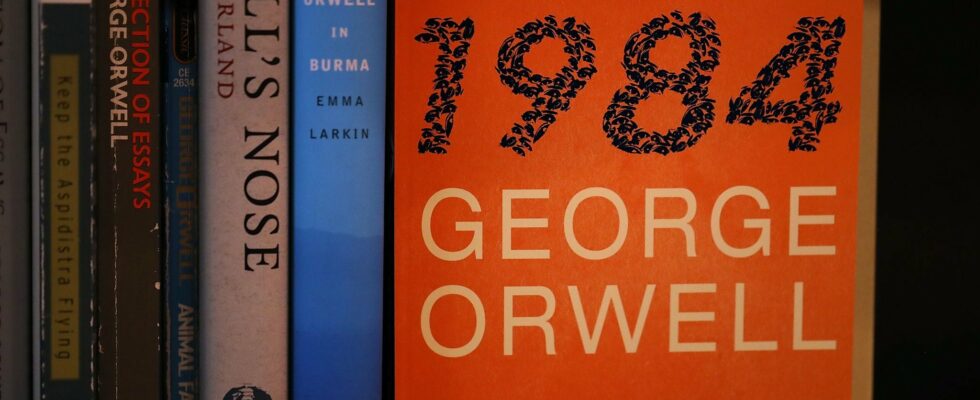George Orwell (1903-1950) was not always the reference he is today. Nobel Prize winner Claude Simon mocked him in a book. What made the great Simon Leys jump, who corrects this funny person in his essential Orwell or the horror of politics : “Let us note that one of his late slanderers was the illegible Claude Simon. In his Georgics (1981), the stupid and base slander is only tempered by the unintelligibility of his prose. But, unless you are a Swedish academic, who would want to read Simon?” This clear and very informed essay is an opportunity for Leys to challenge the “sagacious psychoanalysts and other profound cretins” who have said anything on Orwell One wonders how he would have reacted by opening it. The Invisible Mrs. Orwell by Anna Funder who, in the register, reaches new heights.
Anna Funder has long revered Orwell for his work. One day, she discovered her life by reading seven biographies in succession. Because their authors downplayed the importance of his first wife, Eileen O’Shaughnessy, she wondered: what if her hero was really hiding an “asshole”? Neither one nor two, she began writing an “inclusive fiction” aimed at rehabilitating Eileen. Daughter of her century, Anna Funder falls from the introduction of her pensum into three of the signs of the era: victimization, gibberish and narcissism. We imagine she liked The Hours by Michael Cunningham on Virginia Woolf, and like him, she wanted to mix temporalities. She thus alternates passages about Eileen and vague considerations about her life as a “privileged peri-menopausal person” in search of meaning, crushed by the mental load – an ordeal obviously worse than the Spanish Civil War.
From start to finish we do not understand what she criticizes Orwell for. Having eaten mad cow for a long time? All Eileen had to do was find a banker. Having spent most of his time working? Without this, he would not have built one of the most significant works of the 20th century. Anna Funder explains to us that Orwell didn’t like sleeping with his wife and that he would look elsewhere, while she gave him all her ideas. Just that? In mind-blowing pages, she intends to make Eileen the co-author of Animal Farm. Rebelote with 1984 since Eileen had in her youth written a poem with that title. Problem: Eileen died in 1945 and 1984 was not published until 1949. Unless you believe in ghosts, it is difficult to imagine that Eileen could have dictated the text to Orwell when she was no longer in this world when he was painfully writing his novel, struggling against tuberculosis which would prevail…
1984from Julia’s point of view
If we wanted to be evil (which is not the type of house), we could affirm that it was thanks to his widowhood that Orwell was able to complete his masterpiece. We will not allow ourselves such a bad joke. Let’s just set the record straight: Eileen O’Shaughnessy was in no way “invisibilized”, she simply didn’t have the genius of her husband. Pretending otherwise is as foolish as asserting that Mirka Federer (Roger’s wife) would have had a more successful career than her husband if she had been a tennis player instead of a housewife. “There are some people, like vegetarians and communists, with whom it is impossible to argue,” Orwell said. We can now rank Anna Funder among these annoying people.
We advise serious people to turn instead to Julia by Sandra Newman, who enjoys rewriting 1984 by changing your point of view. We remember that, in the original book, one of the narrative threads is the love story that the hero Winston Smith experiences with Julia. Their clandestine affair ends when they are arrested, tortured and brainwashed. We find this dark imagination in Juliawith this difference that she is now the main character. What changes in a totalitarian dystopia when you are a woman? Sandra Newman explores the blind spots left by Orwell, somehow making the connection with The Scarlet Handmaid by Margaret Atwood. The novelist has several advantages over Anna Funder: she publishes her book with the agreement of Orwell’s beneficiaries and, when she writes in Newspeak, it is voluntary. It’s a shame that the mischievous Simon Leys is no longer in this world: he would have relished this variation full of inventiveness.
The Invisible Mrs. Orwellby Anna Funder, translated from English (Australia) by Carine Chichereau. Héloïse d’Ormesson, 486 p., €23.
Juliaby Sandra Newman, translated from English (United States) by Hélène Cohen. Robert Laffont, 409 p., €22.50.
